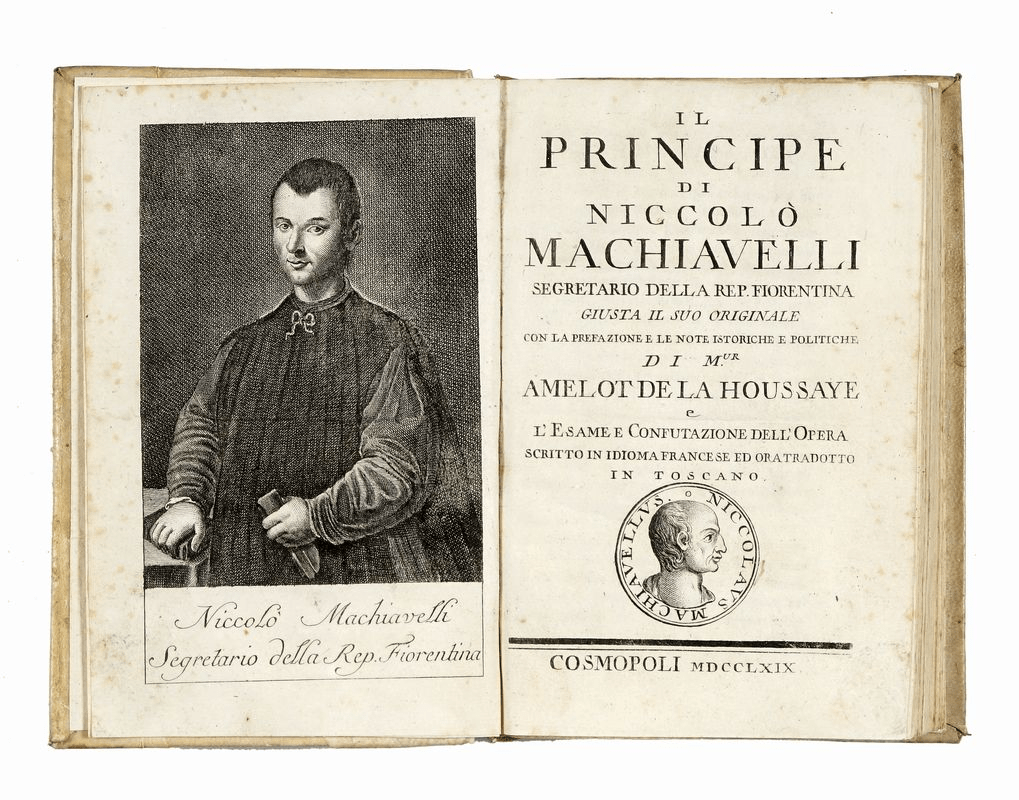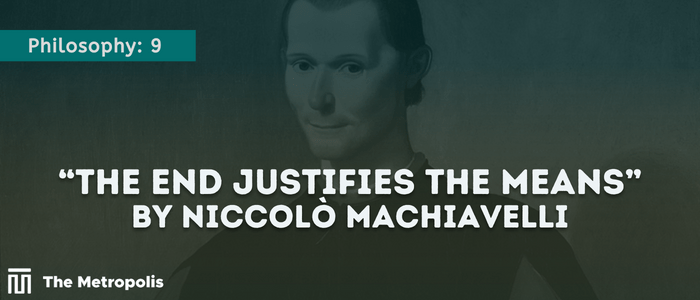Hasan Mahmud –
Niccolò Machiavelli was an Italian Renaissance political philosopher, writer, and diplomat who lived from 1469 to 1527. He is primarily known for “The Principe” (Il Principe), a significant political philosophy work that was published in 1532, five years after his passing. It is regarded as one of the most important works in political science.
In this book, Machiavelli examines the nature of politics and power and is credited with the famous phrase “The end justifies the means”. Since then, this term has come to be associated with his name and has generated a lot of discussion and controversy.

According to Machiavelli, “the end justifies the means” refers to the idea that achieving goals justifies using any means necessary, regardless of their moral ramifications. Some people believe Machiavelli to be a supporter of dishonesty and immorality because of the idea’s frequent associations with ruthless and deceptive strategies. But it is important to comprehend the setting in which Machiavelli produced his writing.
Italy was experiencing political unrest at the time of Machiavelli, with ongoing power struggles among several city-states and foreign invasions. Machiavelli studied the actions of powerful rulers in this chaotic setting to discover what made them effective. His main focus was on the practicalities of attaining and retaining power, not morals or ethics.
The basis of Machiavelli’s viewpoint is a realistic appreciation of both political terrain and human nature. He thought that human beings are naturally selfish and prone to lying and violence. Therefore, to keep power and uphold the interests of the state, a ruler must be prepared to use comparable strategies. According to Machiavelli, a ruler who is too idealistic or constrained by moral principles is likely to be toppled and replaced by someone who is more pragmatist and prepared to go to any length to accomplish their objectives.
Machiavelli’s worldview challenges accepted notions of government from a political standpoint. He makes the case that leaders should put stability and success first, stressing that they must be prepared to make tough decisions and take actions that might be seen as unethical. According to him, this strategy can successfully combat the turmoil and instability that frequently result from ineffective leadership. Machiavelli’s theories, according to their proponents, hold that in a harsh and unforgiving world, leaders must be ready to act decisively in the interest of their nation or community.
Though Machiavelli’s theories were ground-breaking in their day, they have subsequently drawn heavy criticism and discussion. Critics contend that his emphasis on the justification of means by their aims encourages a political philosophy in which any course of action is acceptable so long as it results in the desired result. This point of view is viewed as harmful and morally dubious since it permits the possible abuse of power and the diminution of fundamental human rights.
Critics claim that a society controlled by the maxim “the end justifies the means” runs the risk of becoming a place where dishonesty, corruption, and the abuse of power thrive. Loss of confidence, stability, and social cohesiveness may result from the deterioration of moral principles and the contempt for individual rights.
Despite the debate surrounding his theories, Machiavelli has had a significant impact on political theory. By challenging accepted moral principles, “The Principe” helped pave the way for a more practical and realistic approach to politics. The political theory will never be the same after learning about his insights into human nature, power relationships, and the delicate balancing act between leadership and public opinion.
His understanding that the pursuit of power frequently calls for difficult judgments that may go against conventional ethical frameworks is what gives Machiavelli his enduring value. Politicians, statesmen, and thinkers from later generations have been influenced by this notion. His work has, however, also brought up significant moral issues regarding the bounds of political power and the possible repercussions of putting outcomes above ideals.
The adage “the end justifies the means” is still applicable and debatable in modern society. It poses significant issues regarding the harmony between morality and political realism. It is imperative to make sure that the ways by which particular objectives, such as economic advancement or national security, are pursued do not inadvertently transgress fundamental norms of justice and human rights.
The notion that the goal justifies the means can also be abused and used by people in positions of authority. We have many examples in history of leaders who have rationalized immoral behavior in the name of pursuing lofty objectives. Establishing checks and balances within political systems is crucial to preventing the abuse of power and holding leaders accountable for their deeds.
Machiavelli’s theories are still relevant today since they reflect the realpolitik method of handling international affairs. Realpolitik places a strong emphasis on advancing national interests and employing practical tactics, even when doing so may imply deviant behavior. To attain their goals, nations frequently engage in diplomacy, alliances, and negotiations. However, when required, they may also use coercion, economic pressure, or military action.
The end justifies the means can also be found in the world of business and entrepreneurship. In highly competitive markets, companies often engage in aggressive tactics to gain a competitive edge. This might include aggressive marketing campaigns, undercutting prices, or even engaging in unethical practices such as corporate espionage. The goal is to achieve market dominance or maximize profits, and the means employed may not always align with traditional ethical standards.
Politicians may use dubious strategies to seize and hold onto power, which is another instance of the adage that the ends justify the means. This covers negative campaigning, disseminating false information, or making assurances they won’t keep. Machiavellian strategies are frequently linked to the pursuit of political expediency and a willingness to go to any lengths to accomplish one’s objectives.
There is a persistent discussion in the modern world about how to strike a balance between the pursuit of power and devotion to moral standards. Many contend that moral justification should dictate how decisions are made and that actions taken to accomplish goals should be ethically acceptable. This viewpoint places a strong emphasis on the value of openness, responsibility, and observance of human rights in all endeavors.
Machiavelli’s ideas have found resonance in various forms of popular culture, particularly in literature, film, and television. Numerous individuals exhibit Machiavellian characteristics because they were influenced by his theory that shrewdness and ruthlessness are useful strategies for gaining control and power. Shakespeare’s Iago from “Othello” is among the most well-known instances. Iago exhibits the success of Machiavellian strategies in achieving both personal and political objectives by deceiving and manipulating those around him.
Moreover, arguments about antiheroes in literature and movies frequently reference the “end justifies the means” doctrine. In their merciless quest for power, characters like Walter White from the television show “Breaking Bad” or Frank Underwood from “House of Cards” exhibit Machiavellian values. The behaviors of these characters frequently elicit moral conundrums and raise concerns about the propriety of obtaining objectives through dubious means.
Beyond the realm of fiction, Machiavellian principles have been applied to real-world politics. Machiavelli’s ideas have influenced political strategists and leaders who advocate for a pragmatic approach to governance. Critics argue that some politicians have employed deceit, manipulation, and even violence to achieve their political objectives, citing this as evidence of Machiavellian tactics in action.
Machiavellian ideas have been used in real-world politics in addition to fiction. Political leaders and strategists who support a practical approach to governing have been affected by Machiavelli’s theories. Some politicians, according to critics, have used dishonesty, coercion, and even violence to advance their political agendas. They claim that this is an example of Machiavellian strategy in action.



